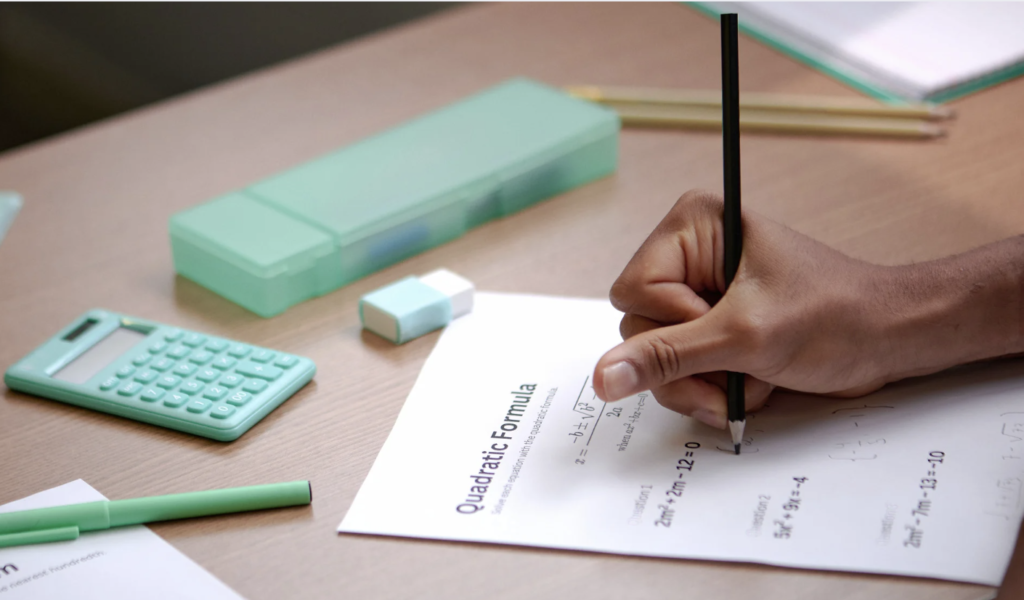GCSE Maths Guide 2025: Key Info for Students and Parents
GCSE Mathematics is a core subject in the UK and essential for further education, university entry, and many careers. A strong grade opens doors to A-levels, apprenticeships, and prestigious job opportunities that require numerical skills.
This guide outlines everything you need to know about GCSE Maths exams, including exam structure, grading, key exam dates for 2025, and valuable tips for effective revision.
Contents
1. Why Should You Take GCSE Maths Seriously?
GCSE Maths is your gateway to further studies, university courses, apprenticeships, and many career fields like engineering, finance, medicine, and technology.
For instance, if you’re aiming to pursue A-levels or enter competitive fields requiring numerical expertise, you’ll typically need at least a grade 6 or 7 in Maths.
2. What is the GCSE Maths Exam Structure?
Do you have to sit all three GCSE Maths papers? Yes! Regardless of whether you’re taking AQA, Edexcel, or OCR, you must complete all three exams.
Each paper lasts 90 minutes and counts equally, 33% towards your final grade.
- Paper 1 (Non-Calculator): Tests basic arithmetic, mental maths, and problem-solving skills without a calculator.
- Paper 2 (Calculator): Allows use of a calculator for complex calculations and problem-solving.
- Paper 3 (Calculator): Also permits calculator use, assessing a wide range of mathematical skills.
3. When Are the 2025 GCSE Maths Exams?
All exam boards (AQA, Edexcel, OCR) have scheduled these exams on the same dates.
- Paper 1 (Non-Calculator): Thursday, 15 May 2025
- Paper 2 (Calculator): Wednesday, 4 June 2025
- Paper 3 (Calculator): Wednesday, 11 June 2025
All exams will be conducted during the morning sessions.
4. How is GCSE Maths Graded?
| Tier | Grade Range (Numbers) | Grade Range (Letters) | Safety Net Grade |
|---|---|---|---|
Higher | 9 – 4 | A* – C | Grade 3 (equivalent to D) |
Foundation | 5 – 1 | C/B – G | None |
GCSE Maths offers two tiers with different grading scales:
- Higher Tier: Covers grades 4–9. (ideal for students targeting higher education and maths-intensive careers)
- Foundation Tier: Covers grades 1–5 (aimed at students who find Maths more challenging)
The Higher Tier includes a “Safety Net” feature: If you narrowly miss a grade 4, you might still secure a grade 3, recognising the effort and potential.
5. What Topics Are Most Important in GCSE Maths?
The Department for Education (DfE) sets percentage weightings for each topic in Foundation and Higher Tier exams.
- In the Foundation Tier, the largest topic areas are Number and Ratio, Proportion & Rates of Change.
- The Higher Tier, Algebra carries the most weight, followed by Geometry.
| Topic | Foundation (%) | Higher (%) |
|---|---|---|
| 25% | 15% | |
| 25% | 20% | |
| 20% | 30% | |
| 15% | 20% | |
| 15% | 15% |
6. What Are the Top GCSE Maths Revision Tips?
- Start with Past Papers: Practising with real exam papers is one of the best ways to revise. It helps you get used to the format, timing, and types of questions. Download our GCSE Maths past papers and mark schemes to get started.
- Use the Formula Sheet Effectively: You don’t need to memorise every formula, but you must know how to use them. Download and practise with the official 2025 GCSE Maths formula sheet.
- Focus on Your Weakest Topics: Use topic weightings to prioritise where you spend your time. For example, if you’re doing Foundation Tier, make sure you’ve mastered Number and Ratio as they carry the most marks.
Related blogs

Are you preparing for the GCSE Maths?




